Subscribe to ‘Words Of Hope’
Get our emails direct to your Inbox with updates about all our campaigns, trips and events.
“Receiving a breast cancer diagnosis is incredibly difficult for any woman, wherever they may be, whatever their situation. Receiving this diagnosis if you live in Gaza is even more devastating and complicated.” Katie Hagley writes about her recent visit to Al Ahli Arab Hospital in Gaza.
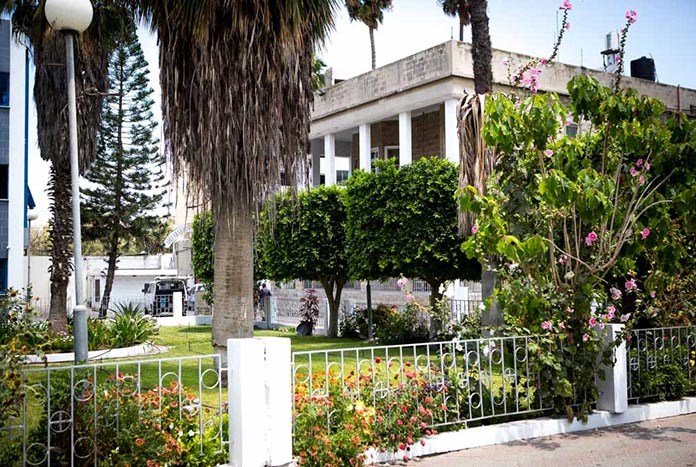
How The Light Gets In
Al Ahli Arab Hospital, Gaza City
Imagine for a minute that you are a woman in Gaza; you think that you have found a lump, but your instinctive reaction is to try to block it out, to hope that you are wrong, because you have seen how other women who have breast cancer have been stigmatised.
There is a feeling of shame surrounding it. You are afraid to go to a hospital, you fear embarrassment, and then what if they tell you, you do have breast cancer? How will you tell your husband, your family? Will your husband leave you and take another wife? Will your daughter be able to find a husband when people worry that breast cancer is hereditary?
And what about the costs of treatment? You have already heard that it often involves having to travel to Jerusalem for radiotherapy. How could you afford that? Your husband is unemployed, and your family relies on food support like most of the population (over 70%).
There is a feeling of shame surrounding it. You are afraid to go to a hospital, you fear embarrassment, and then what if they tell you, you do have breast cancer?
Your children are already fearful when you are not there, traumatised by recent conflicts. How will they cope without you? And how would you even get a permit? They are so hard to get, and so many are refused. Maybe you can just ignore it a bit longer, but you remember the woman who had to have a double mastectomy recently, because, she said, she left it too long to get diagnosed.
Breast Cancer in Gaza
Breast cancer accounts for over 32% of women’s cancer cases and kills more women than any other form of cancer in Gaza. Survival rates are 30-40% compared to 87% in the UK. Women are often reluctant to seek early diagnosis, which means they present late. Up to 60% of women present themselves for diagnosis after their cancer has spread.
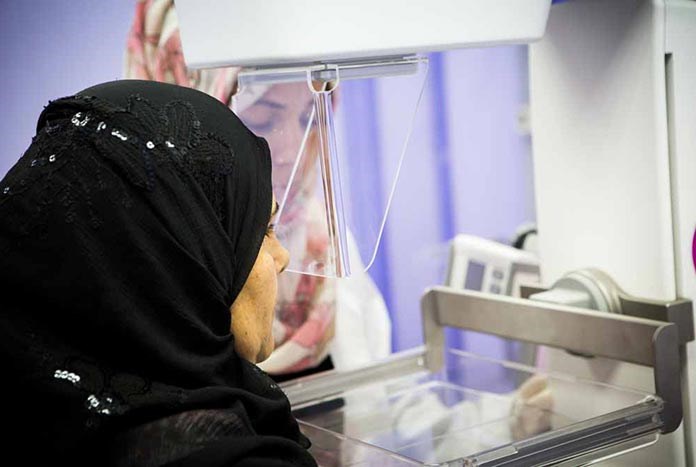
Mitigating increased risk: A women receiving breast cancer screening at Al Ahli Arab Hospital in Gaza City
— — — — — — —
According to Islamic Relief’s ‘Mapping Study for Cancer Care in the Gaza Strip’: the barriers to cancer-seeking behaviour, are that "the patients are afraid of unexpected results, or fearful of social stigma, or emerging family problems (the husband may re-marry if his wife has breast cancer)."
With late diagnosis comes the increased risk of not being able to access the right treatment.
Breast cancer accounts for over 32% of women’s cancer cases and kills more women than any other form of cancer in Gaza. Survival rates are 30-40% compared to 87% in the UK.
Radiotherapy is often needed when breast cancer is detected at the later stages and radioisotopes, which are integral to radiotherapy treatment, are forbidden entry into Gaza by the Israeli authorities. This means patients must travel to Jerusalem for treatment; they must try to obtain a visa to leave Gaza (28% of which are rejected) and then travel alone to receive treatment if they receive the proper permissions, often leaving their children at home.
Community Outreach
Early diagnosis is therefore vital and can only be done by overcoming the fear and social stigma surrounding breast cancer.
Al Ahli Arab Hospital seeks to educate 5,000 women a year about the importance of self examination and breast cancer screening. They aim to screen over 3,000 women over 40, every year. But the solution starts away from the hospital, meeting women where they are through their 35 mobile clinics and community outreach programmes.
Their community outreach workers, often women who have been diagnosed with breast cancer themselves, go out to local communities, particularly in poorer areas where there may be lower levels of education. They spend time encouraging women to go for screening, talking them through the process, telling their stories and explaining why early diagnosis is so important. And they don’t stop with the women, they speak to the men too, encouraging them to support their wives in going forward for screening and to continue supporting them, whatever the result.
Al Ahli Arab Hospital seeks to educate 5,000 women a year about the importance of self examination and breast cancer screening. They aim to screen over 3,000 women over 40, every year.
Al Ahli also works with cancer support centres. We visited Al Ahli earlier this year and went to one of the centres called the ‘Smile of Hope Cancer Centre’ with Mohamed Ali Hassan, the head of the hospital’s social work team. Upon entry into ‘Smile of Hope’, we were surrounded by colourful, uplifting messages and images, with information about Rosy October (the equivalent of breast cancer awareness month) on every wall.
We were greeted by Sami, who told us: “Early discovery is critical and must be our priority; that is why we need mobile clinics going out to all the communities.” As well as educating people about the importance of screening, the centre is a place for cancer patients to go for support throughout their journey.
A Place of Peace: Al Ahli Arab Hospital in Gaza City
— — — — — — —
Sami explains, “If you find you have cancer in Gaza, the Government will pay for you to have treatment in Israel, including accommodation, but they do not pay for transport. The hospital applies for the permit, but if the woman gets permission to travel, we organise and pay for it. We use Palestinian and Israeli volunteers from the West Bank.”
The centre also provides support when they return home after receiving treatment, offering physiotherapy, counselling, and even a haircare service. Amal’s hair salon is full of wigs made from hair that had been donated. Amal told us her name meant hope and said, “I had cancer in 2003. I was lucky; I did not lose all my hair, but I was worried I would. Instead, it got a lot thinner. I want to help women feel their best during a difficult time.”
The Screening Process
We arrived to see the breast screening clinic in full swing. Here women receive mammograms and while waiting to be checked, are shown how to perform a self-examination using prosthetic breasts. Mohamed gave me a quick lesson and encouraged me to feel the prosthetic breasts they use to demonstrate — some with lumps and others without.
“If you find you have cancer in Gaza, the Government will pay for you to have treatment in Israel, including accommodation, but they do not pay for transport.
If any suspicious lumps are found the women are immediately offered ultrasound and a surgical consultation, followed by a ‘Trucut’ biopsy or fine needle aspiration (whichever is most appropriate) to confirm a diagnosis. The hospital will provide the proper course of action if a woman has a positive diagnosis. If she needs radiotherapy (outside of Gaza), they will recommend visas and put her in touch with local groups to help with transport and support. Of 1,000 women screened in 2019, 25% required further tests, and 8% required treatment.
Health, Mind and Body
I was particularly impressed with the Health, Mind and Body clinics Al Ahli runs. Arriving at one of the sessions we found women — laughing and playing games, listening to music and dancing together.
The twice weekly clinics are open to all women who receive a positive diagnosis through Al Ahli (about 340 per year). Women are offered psychological support and education around self-care methods, such as massage. In addition, the group provides a support network and helps women to socialise again.
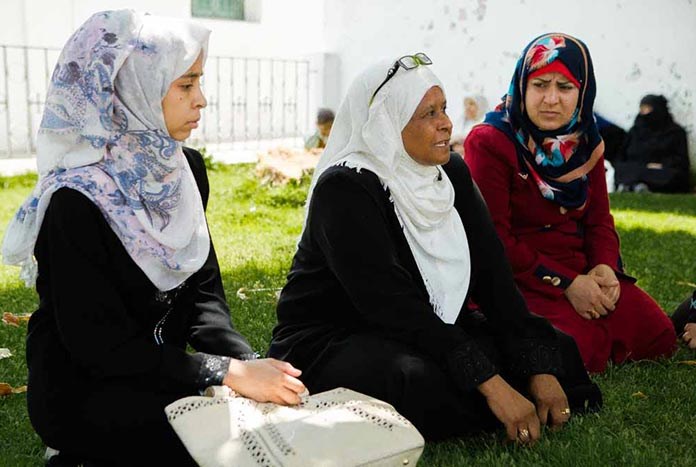
Fearless, not lonely: A group of women chatting in the garden of Al Ahli Arab Hospital in Gaza City
— — — — — — —
It was easy to see how relaxed they were with one another, and a delight to be welcomed into the group to chat and ask just what the group meant to them. For example, Leila told us: “Before, I felt isolated, always worried, under pressure, crying, and no one to talk with. There are many faces here, and my social situation has changed.” Another woman told us: “Sometimes we’re happy, sometimes we cry, and we feel comfortable. We’re fearless and not lonely.”
A Challenger’s story
Having spent time visiting the clinics, we walked across the garden at Al Ahli, and I can see why they talk about the hospital as a place of peace. This green garden, the flowers and the sound of birds singing gave a feeling of calm amongst the bustle of the streets outside. After a difficult diagnosis, I imagined how welcome the gardens must be, to sit and reflect.
Women are offered psychological support and education around self-care methods, such as massage. In addition, the group provides a support network and helps women to socialise again.
Next, Mohammed takes us to meet Nadaa and her 16-year-old daughter Fatima (“but please call me Honey,” Fatima says in excellent English). I am immediately struck by the closeness between mother and daughter, the way Fatima supports Nadaa and the intimate smiles between them. Nadaa is a former patient of the hospital, a ‘Challenger’, as Al Ahli calls the women with breast cancer.
Nadaa begins by telling us that in 2014, she spent 56 days in Jerusalem receiving treatment and during that time, the 52-day-long attack on Gaza took place. She had left her two young daughters with her father. She talked of her fear for them all while receiving this difficult treatment. Then she took us back to the beginning, explaining how even before her diagnosis, she knew Al Ahli well.
She had spent three years going out into communities with Al Ahli’s community programme as a volunteer. Her role was to tell women about the importance of screening and of overcoming their fear of stigma and explaining the importance of mammograms. Yet when she felt a lump in her breast, she delayed getting it checked. Despite knowing how important it was to get an early diagnosis, Nadaa still feared how her family would react and felt shame — a word she used several times.
When she was finally checked, it was found that the cancer was quite advanced. Yet, she still held off telling people and continued to go out to the communities on behalf of Al Ahli. Two months later, Nadaa had a double mastectomy at Al Ahli, only telling her family the day before. Sadly her husband was not supportive, and they are now separated. Upon returning from radiotherapy treatment in Jerusalem, she finally started to tell people in the community that she had breast cancer, previously, people had presumed she was away with her work as a journalist.
Nadaa begins by telling us that in 2014, she spent 56 days in Jerusalem receiving treatment and during that time, the 52-day-long attack on Gaza took place. She had left her two young daughters with her father.
Sadly, four years later, Nadaa’s cancer has returned and spread further and is now in the 4th stage. Her daughter is very supportive of her, and although Nadaa is undergoing treatment elsewhere, she still comes back to Al Ahli, “because Al Ahli is a big thing for me, I am still a big supporter. Sometimes, they ask about me and if I need anything. I come because I love Al Ahli. I am very tired, but I love it, so I come here.”
And her message to other women? “Now I am here, I am strong, and I have a message for breast cancer women. At the beginning of my disease, I was ashamed to go to the doctor or to investigate or do a consultation. However, I was educated, even though I advised women, saying, “Don’t feel ashamed, go and get a mammogram, go and see a doctor. If it is early detection, it will be easy for you to continue your life, but if it is too late, it is very bad for you — triple the medication.”
Our Response
Christmas Appeal 2022
Each year during Breast Cancer Awareness month we encourage women to organise awareness-raising and fundraising events entitled Women 4 Women for the Al Ahli Breast Cancer Screening Programme (see below). This year we decided to go a step further and make it the central part of our Christmas appeal.
We are excited that we are running this with the Big Give, which means that all donations will be doubled between midday on Tuesday 29th November until midday on Tuesday 6th of December.
By visiting our appeal web page, you can find full details of how donations will be used and how you can double yours. So please give what you can and let others know about this great opportunity to have their support doubled.
You will also hear more about Al Ahli and life in Gaza at our upcoming Christmas tour, when we will be joined by members of another of our Gazan partners, We Are Not Numbers. We will be showing a new short film they have made about Al Ahli’s Breast Cancer Screening Programme, so do bring friends and family along — it’s a great way to start the Christmas season.
Women 4 Women
Download our free fundraising pack
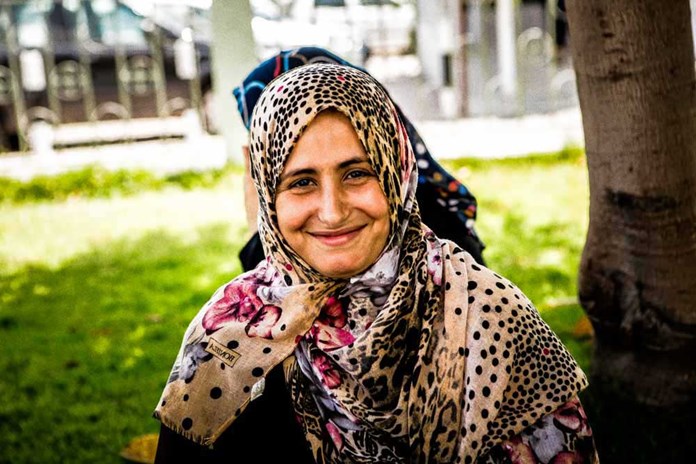
Women 4 Women: Standing in solidarity with the women of Gaza
— — — — — — —
Our Women 4 Women campaign normally runs from October (breast cancer awareness month) and throughout the autumn/early winter. But we are more than happy for you to support this amazing work at any time of year.
Here’s some suggestions below for events you could run this autumn and adapt for any time of year. You can organise your own Christmas Women 4 Women event — please visit our website for full details.
You could have a Christmas drink with your girlfriends, show them the new film and encourage them to donate. Or, maybe run a sweepstake during the Strictly Come Dancing final — with the winner getting a prize. The money raised will go towards our Christmas Appeal, which means that another woman will receive a vital scan.
Our Women 4 Women campaign normally runs from October (breast cancer awareness month) and throughout the autumn/early winter. But we are more than happy for you to support this amazing work at any time of year.
Maybe you could organise a New Year’s Day run, swim or walk? It’s entirely up to you. Our Christmas Appeal runs until early January, and I will be delighted to provide any support, and if you need some more ideas, you can find them in our Women 4 Women Pack.
Give a digital Gift this Christmas
View all our digital gifts for 2022
Finally, we also have our Digital Gift Certificates, which are an ideal present for those hard-to-buy-for friends and relatives in your life. We’ve added three new digital gifts for 2022. Proceeds from the sale of all our digital gifts will go towards the relevant area of our work.
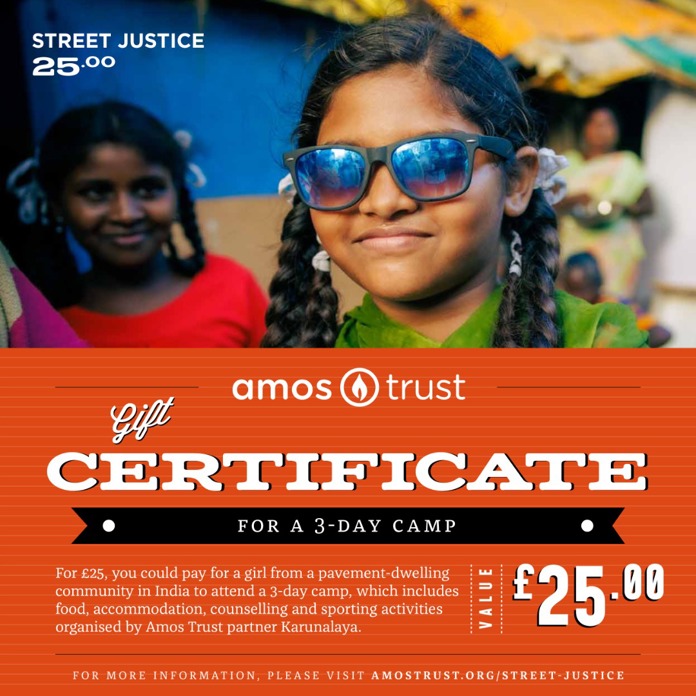
Go Digital: For those ‘hard-to-buy-for’ friends.
— — — — — — —
I returned home humbled by seeing Al Ahli’s Breast Cancer Screening Programme and its incredible impact. Let’s give as many women as possible, in Gaza, an amazing, life-changing gift this Christmas.
Katie Hagley
— — — — — — —
A Little More...
More First Of The Month
Older editions of our First Of The Month essays are available to read and download here.
Words Of Hope E-news
Sign up to receive our regular ‘Words Of Hope’ emails and keep up to date with all the latest Amos news and information, including details of our trips and events, news from our partners around the world and all of our campaigns.
Online reflection
Join us every Tuesday at 5pm for ‘Words Of Hope’ — our online reflection. Simply click here to join us a few minutes beforehand.
Amos Trust
7 Bell Yard, London
United Kingdom
WC2A 2JR
Telephone:
+44 (0) 203 725 3493
Email:
[email protected]
Registered Charity No.
1164234

This item has been added to your shopping basket. Please click on the Checkout button below where you can choose your quantity.
Continue shopping Checkout Close